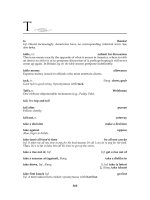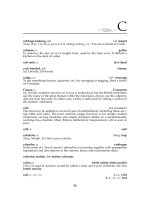british univercities
Bạn đang xem bản rút gọn của tài liệu. Xem và tải ngay bản đầy đủ của tài liệu tại đây (1.1 MB, 24 trang )
Made by: Tatyana
Yakelevich,
Ksenija Kotenok,
Svetlana Gurina,
Viktoria Brodovich
British
universities are selfgoverning institutions.
Although they all receive
considerable financial support
from the state, it has no control
over their regulations,
curriculum, examinations or the
way in which government money
is spent.
University
students have
lectures, classes, seminars, and
tutorials, and their studies are
usually directed by tutors.
At the end of the full course of
studies students receive a
diploma or a first degree, that
is a Bachelor's degree.
Admission to most British
universities and other
institutions of higher education
is usually by interviews.
Kings College Cambridge
CambridgeUniversity
crest
The
University of Cambridge is a
public research university located in
Cambridge, United Kingdom. It is the
second oldest university in both
England and the English-speaking
world and the seventh oldest
university globally. In post-nominals
the university's name is abbreviated as
Cantab, a shortened form of
Cantabrigiensis.
The
university grew out of an
association of scholars in the city of
Cambridge that was formed, early
records suggest, in 1209 by scholars
leaving Oxford after a dispute with
townsfolk. The two "ancient
universities" have many common
features and are often jointly referred
to as Oxbridge. In addition to cultural
and practical associations as a historic
part of British society, the two
universities have a long history of
rivalry with each other.
Academically,
Cambridge ranks as
one of the world's top universities,
as well as a leading university in
Europe, and contends with Oxford
for first place in UK league tables.
Affiliates of the University have won
more Nobel Prizes than those of any
other institution in the world - with
88 Nobel Laureates as of October 4,
2010 - the most recent one being
Robert G.
Edwards
for the prize in
physiology or medicine. The
University is a member of the
Russell Group of research-led
British universities, the Coimbra
Group, the League of European
Research Universities and the
International Alliance of Research
Universities. It forms part of the
'Golden Triangle‘ of British
universities.
As
an institution with such a long history,
the University has developed a large number
of myths and legends. The vast majority of
these are untrue, but have been propagated
nonetheless by generations of students and
tour guides.
A discontinued tradition is that of the
wooden spoon, the ‘prize’ awarded to the
student with the lowest passing grade in the
final examinations of the Mathematical
Tripos. The last of these spoons was
awarded in 1909 to Cuthbert Lempriere
Holthouse, an oarsman of the Lady Margaret
Boat Club of St John’s College.
It
was over one metre in length and had an oar
blade for a handle. It can now be seen outside the
Senior Combination Room of St John's. Since 1909,
results were published alphabetically within class
rather than score order. This made it harder to
ascertain who the winner of the spoon was, and so
the practice was abandoned.
Each Christmas Eve, BBC radio and television
broadcasts The Festival of Nine Lessons and Carols
by the Choir of King's College, Cambridge. The
radio broadcast has been a national Christmas
tradition since it was first transmitted in 1928.The
radio broadcast is carried worldwide by the BBC
World Service and is also syndicated to hundreds
of radio stations in the USA. The first television
broadcast of the festival was in 1954.
The University of Liverpool is a
teaching and research university in
the city of Liverpool, England. It is a
member of the Russell Group of
large research-intensive universities
and the N8 Group for research
collaboration. Founded in 1881 it is
also one of the six original "red
brick" civic universities. The
university has produced eight Nobel
Prize winners and offers more than
230 first degree courses across 103
subjects. It has an annual turnover of
£340 million, including £123 million
for research.
Liverpool
has the sixth largest financial
endowment of any UK university, valued at
£110m, according to the Sutton Trust. It is a
member of the Russell Group of Universities
and a founding member of the Northern
Consortium.
The University has over 23,000 registered
students, with almost 18,000 full-time
registered students. The University has a
broad range of teaching and research in
both arts and sciences, and has a large
medical school, which is associated with the
neighbouring Royal Liverpool University
Hospital.
In
September 2008, Sir Howard Newby took up
the post of Vice-Chancellor of the University,
following the retirement of Sir James
Drummond Bone.
The University has a Students' union to
represent students' interests, known as the
Liverpool Guild of Students.
It should be noted that whilst Liverpool has a
total of five universities, the colloquial term
Liverpool University commonly refers to the
University of Liverpool rather than either of
the other four, Liverpool Hope University,
Liverpool John Moores University, Edge Hill
University, or LIPA.
The Open University is a
distance learning and research
university founded by Royal
Charter in the United Kingdom
and funded in part by the
United Kingdom Government. It
is notable for having an open
entry policy, i.e. students'
previous academic
achievements are not taken
into account for entry to most
undergraduate courses
The
majority of the OU's undergraduate
students are based in the United Kingdom
and principally study off-campus, but
many of its courses can be studied offcampus anywhere in the world.
There are a number of full-time
postgraduate research students based on
the 48 hectare university campus where
they use the OU facilities for research, as
well as more than 1000 members of
academic and research staff and over
2500 administrative, operational and
support staff.
The
OU was established in 1969 and the
first students enrolled in January
1971.The University administration is
based at Walton Hall, Milton Keynes in
Buckinghamshire, but has regional
centres in each of its thirteen regions
around the United Kingdom. It also has
offices and regional examination centres
in most other European countries. The
University awards undergraduate and
postgraduate degrees, as well as nondegree qualifications such as diplomas
and certificates, or continuing education
units.
With
more than 180,000 students
enrolled, including more than 25,000
students studying overseas,it is the
largest academic institution in the United
Kingdom and Europe by student number,
and qualifies as one of the world's largest
universities.
Since it was founded, more than 3 million
students have studied its courses. It was
rated top university in England and Wales
for student satisfaction in the 2005 and
2006 United Kingdom government
national student satisfaction survey, and
The
Open University is also one of only two
United Kingdom higher education institutions
to gain accreditation in the United States of
America by the Middle States Commission on
Higher Education, an institutional accrediting
agency, recognized by the United States
Secretary of Education and the Council for
Higher Education Accreditation.
In May 2009, David Cameron, leader of the
United Kingdom political Conservative Party
and a regular speaker at the Open University
campus in Milton Keynes, delivered a keynote
speech praising the OU for 'innovation'.
As
recent as 7th June
2010, and now serving
as the newly elected
Prime Minister of the
United Kingdom, David
Cameron once again
returned to choose
the Open University
campus to deliver
another keynote
speech on the United
Kingdom's economy
and outline his new
government's plans to
tackle the economic
challenges that lay
ahead.









